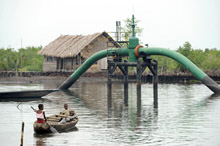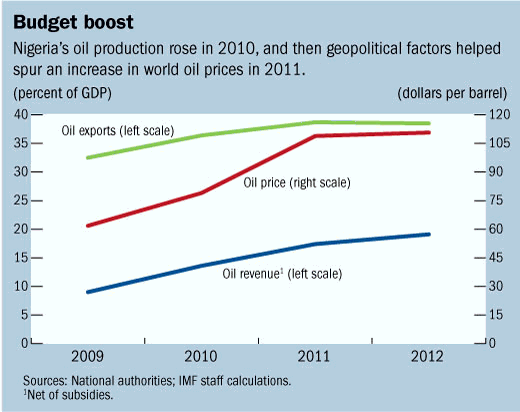
Typical street scene in Santa Ana, El Salvador. (Photo: iStock)
IMF Survey: High Oil Prices, Reform Agenda Improve Nigeria's Prospects
March 14, 2012
- Economy has grown robustly through global downturn, domestic banking crisis
- Important to strengthen bank regulation, supervision
- Reforms, particularly in infrastructure, crucial for economic development
Booming oil prices and an ambitious reform agenda have placed Nigeria well to ride the worst effects of the global economic downturn.

Oil pipeline in Bonny, Nigeria, where higher oil prices have boosted budget revenues, eased impact of lower tax receipts (photo: Pius Utomi Ekpei/AFP)
ECONOMIC HEALTH CHECK
The IMF says in its regular assessment of the west African nation’s economy that there is room for the authorities to further strengthen management of the economy and reach development goals.
The IMF review notes that the government has launched an economic program that aims to sustain the robust growth of the economy but also ensure substantial employment creation and poverty reduction. For this, IMF economists urge more effective spending on infrastructure and the expansion of more labor-intensive sectors.
Nigeria’s macroeconomic performance has been generally positive in recent years, the IMF review says. The economy grew, on average, by more than 7 percent over the past three years and inflation is trending downward. Substantial oil saving buffers, built before the 2008 global crisis, provided room for Nigeria to implement countercyclical policies to minimize the impact of the crisis on the domestic economy. However, while Nigeria’s growth has been among the highest in sub-Saharan Africa, poverty remains high and progress on many of the poverty-reducing Millennium Development Goals has been slow.
Booming oil revenue
Nigeria is Africa’s largest oil producer, and national oil production rose in 2010 just before global geopolitical factors helped spur an increase in world oil prices. Higher oil prices boosted budget revenues and softened the impact of lower tax receipts in recent years, while creating room for investment spending in the priority sectors (see chart).

With the outlook for the global economy subject to substantial downside risks, there is room for Nigeria to further strengthen macroeconomic management and improve its economy’s resilience, including
• Rebuilding fiscal buffers. The government’s planned fiscal consolidation for 2012–15 will be essential to rebuild reserves that could once again be used as a buffer in the event of a major downturn in oil prices.
• Strengthening the management of oil revenues. The establishment of a sovereign wealth fund will help improve oil revenue management, especially if there are clear rules governing withdrawals from the fund, the management of its resources, and the setting of the reference oil price upon which the budget is based.
• Focusing monetary policy on inflation. A clear inflation objective, while allowing a gradual adjustment of the exchange rate over time in response to market conditions, will also bolster the central bank’s ability to build international reserves.
Resolution of banking crisis
Back in 2009, 10 of the country’s 24 banks, accounting for close to 40 percent of total system assets, had to be rescued. Among other measures the central bank replaced management teams in eight banks, guaranteed interbank transactions, injected over $4 billion of liquidity, and eventually established an asset management company to purchase nonperforming loans and recapitalize three small nationalized banks.
The recapitalization process is near completion and initiatives are under way to further strengthen the regulatory and supervisory framework. From now on, the central bank needs to remain alert and continuously strengthen financial regulations and supervision.
Moreover, given negligible involvement of the financial sector in the activities of the largest economic sectors such as agriculture and informal trade, measures to improve access to credit by those sectors—such as strengthening of credit bureaus, expanding options to collateralize credit, and proactively developing domestic capital markets—are to be welcomed.
Reforms for economic transformation
The government’s Transformation Agenda is an economic program that aims to sustain the robust growth of the economy but also ensure a much stronger impact on boosting jobs and cutting poverty. The program focuses on economic diversification, to be achieved mainly by expanding infrastructure; promoting labor-intensive sectors; and safeguarding macroeconomic stability.
• Addressing severe infrastructure bottlenecks. The 2012 World Bank Doing Business Report highlighted the need to reduce infrastructure bottlenecks. For instance, Nigeria has just one-tenth the electricity generation capacity of South Africa, while having four times its population. The two areas of the government’s focus are electricity generation and transport. The authorities have launched a comprehensive reform program that aims to complete ongoing power projects and encourage private investment into the sector and thus raise generation capacity by 100 percent in the next two years. A major objective will be to reorient expenditures towards capital projects and to build capacity for effective implementation of a larger capital budget—in recent years, the execution rate has averaged around 70 percent.
• Promoting labor-intensive sectors. The authorities are focused on transforming agriculture from a largely subsistence operation into a modern, commercially oriented sector. The reforms involve much-needed investment in irrigation projects and transportation networks that will serve agricultural areas, promotion of value chains to create linkages to the manufacturing sector, and improved access to financial services.
• Safeguarding macroeconomic stability. To create space for the scaling up of public investment while ensuring continued macroeconomic stability, the authorities’ medium-term expenditure framework aims to substantially restrict the growth of recurrent spending and to improve nonoil revenues. However, introducing measures to generate the fiscal space may, in some cases, prove to be difficult. For instance, owing to public opposition the government had to backtrack in its attempt to remove the gasoline subsidy in January 2012. It will therefore be important to deliver some quick gains from the reforms in order to build support for potentially difficult future policy decisions.


